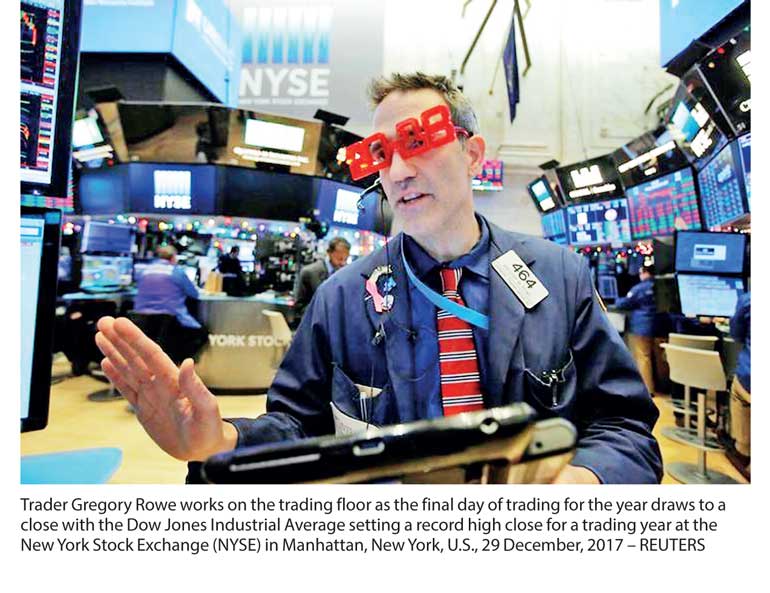Wednesday Feb 25, 2026
Wednesday Feb 25, 2026
Friday, 26 January 2018 00:00 - - {{hitsCtrl.values.hits}}
 Bengaluru (Reuters): The global economy is expected to grow at a robust pace this year and reach an altitude not seen since 2010, as momentum builds in developed economies and inflation revives, Reuters polls of over 500 economists showed.
Bengaluru (Reuters): The global economy is expected to grow at a robust pace this year and reach an altitude not seen since 2010, as momentum builds in developed economies and inflation revives, Reuters polls of over 500 economists showed.
Major central banks are expected to move away from ultra-easy monetary policy this year, but borrowing costs are still accommodative and should underpin growth.
The latest Reuters polls taken this month, covering more than 45 countries, not only underscored optimism on growth but also showed inflation forecasts were either upgraded or left unchanged in nearly 70% of those economies.
“For the first time in a long while, global growth is speeding up away from its average rather than recovering back towards it,” said Credit Suisse Chief Economist James Sweeney.
The global economy is predicted to grow 3.7% this year, the fastest since the 4.3% in 2010.
That was an upgrade from the 3.6% predicted in October 2017’s poll but lower than the International Monetary Fund’s outlook of 3.9% growth this year.
Nearly 70% of over 140 respondents who answered an extra question said the global economic boom was more likely to gain momentum this year and push inflation higher than currently predicted.
Those expectations were largely driven by growth in developed economies, particularly the euro zone and the United States, which may not be firing on all cylinders yet but enough to keep things rolling.
Surging business and consumer confidence and steady job creation have left economists repeatedly raising growth estimates for the euro zone and its major economies.
The rising euro poses a threat in Europe and could challenge the European Central Bank as it moves to end its money printing by the end of the year.
“All the conditions for the classic macroeconomic sequencing of a growth phase have now come together. All the countries in the EU have not only seen a return to positive growth but are showing a marked acceleration in activity,” wrote Credit Agricole CIB Chief US Economist Michael Carey in a note. “The ECB has again signalled that, despite the improved growth prospects, the process of monetary normalisation will be slow, and it has managed to lock market expectations into its timetable.”
But for Britain, above-target inflation and a buoyant job market won’t push the Bank of England to tighten policy until at least November as it waits to see how divorce talks with the EU develop.
The US economy was predicted to grow at its fastest pace in three years this year, fuelled by the biggest tax overhaul since the 1980s, but economists said the expected boost will be short-lived and will keep the Federal Reserve on track with its current guidance of three interest rate increases this year.
One conclusion from the latest surveys was inflation expectations, which showed the risk is now skewed more to the upside, with last year’s pessimism somewhat tempered.
Trade protectionism
threat limited
While economists previously had repeatedly warned about ‘deep uncertainty’ to the global economy from protectionist policies, particularly on US President Donald Trump’s ‘America First; trade policies, the latest polls showed that was slowly fading. Indeed, over 80% of nearly 140 economists who answered a separate question said any significant barriers to global trade in 2018 were unlikely.
“Global trade barriers are definitely a downside risk to our forecasts this year, but is not our baseline case. No country will benefit from erecting trade barriers, so we see such an outcome as still unlikely,” said Bank of the West Chief Economist Scott Anderson.
But the remaining 24 respondents said some barriers were likely to emerge. A few hurdles mentioned were the North American Free Trade Agreement (NAFTA) talks, Brexit negotiations and rising risks of a US trade war with China.
A majority of economists in a separate Reuters poll last week said NAFTA will probably be renegotiated successfully with no significant changes, despite the Trump administration’s sabre-rattling.
“I still suspect that adults will prevail and NAFTA will not be allowed to collapse,” said Northeastern University (Boston) Economics Department Head William Dickens.
But concerns over US protectionism and a nationalist presidential candidate have weighed on the peso, stoking fears of faster inflation in Mexico. Barring that country, the latest poll showed economists’ confidence in Latin America’s growth prospects strengthening ahead of major elections in the region. Expectations of solid economic growth though was not widespread to other emerging market economies, with Turkey, India and China forecast to slow this year.